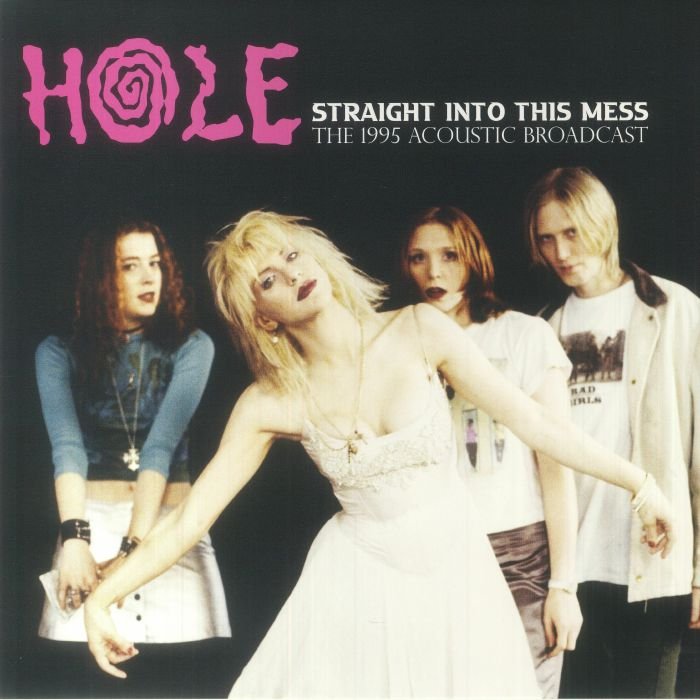 Image 1 of 3
Image 1 of 3

 Image 2 of 3
Image 2 of 3

 Image 3 of 3
Image 3 of 3




Jack McDuff. Live At Parnell's.
Label: Soul Bank Music – SBM007LP
Format: 3 x Vinyl, LP, Album
Country: UK
Released: 2022
Genre: Soul-Jazz
Label: Soul Bank Music – SBM007LP
Format: 3 x Vinyl, LP, Album
Country: UK
Released: 2022
Genre: Soul-Jazz
Label: Soul Bank Music – SBM007LP
Format: 3 x Vinyl, LP, Album
Country: UK
Released: 2022
Genre: Soul-Jazz
Jazz organist ‘Brother’ Jack McDuff (born Eugene McDuffy in 1926 September 17, 1926 – January 23, 2001) was second only to the infamous Jimmy Smith in terms of fame and the impact he made with the King of keyboard instruments - the Hammond B-3 Organ. Self-taught on the organ, he recorded with Willis Jackson & Roland Kirk in the late ’50s and early ’60s, cutting high calibre souljazz dates for Prestige Records, and later Argo / Cadet. Blue Note and Verve Records. McDuff can also take the credit for launching the career of a particularly gifted young jazz guitarist when he recruited George Benson to his own quartet, which resulted in Benson's first solo deal in the mid 1960’s.
‘Live At Parnells’ is made up of 15 tracks selected from a week-long engagement in June 1982. Stylistically, Jack and his group cover a lot of ground, especially for an organ quartet – from beautifully old school funky, gritty blues with tracks like Walkin’ The Dog & Blues 1 & 8, jazz standards like April In Paris, and A Night In Tunisia through to some frenetic and distinctly edgy fast paced jazz fusion type numbers - Make It Good and Untitled D Minor - and this reflects how Jack's ears were open to the newer, freer sounds that had developed in jazz and reflected in some of his recordings as ‘The Heatin’ System’ – as several tracks have modal and fusion touches that sound remarkably current. Soul Bank’s Greg Boraman explains the 23 year old back story to how this amazing release of previously unreleased music by a bona fide jazz legend came about.
It was into the inviting environment of Parnell’s that Jack McDuff, one of the soul jazz organ combo, brought his quartet for a week-long engagement in June 1982. The clubs resident sound engineer, Scott Hawthorn, who made these original private recordings, also just happened to be a keen jazz organist himself, and naturally relished seeing one of the greatest exponents of jazz organ ever up close and personal.
“Parnell’s was essentially Seattle’s jazz club central. As a working jazz organ player and a professional theatrical lighting designer, I needed an extra source of income, as we all did. So my role became the official dog’s body, doing anything they needed. This meant stage sound, which was very limited then, some nice stage lighting, and working the door on some evenings. I had to spread myself pretty thin, but it worked out.
“On this week-long visit to Seattle in July of 1982, Jack brought his own Hammond B-3, a well-used early seventies model. It featured a warning sign on the back, in red and black, that said ‘DANGER’ and sported scary lightning bolts. A wise warning because Jack was playing his ass off on these dates! I’d got to know him pretty well during several of his previous visits to Seattle. He was usually a taciturn man but he also had a sharp sense of humor at times. He could be moody, and able to convey a deep sadness in his playing, and I think that’s one of the traits that made him such a moving player. At other times his style, especially on blues, was joyful with a rollicking beat.”
Scott’s observations are borne out in his recordings. Stylistically, Jack and his group cover a lot of ground, especially for an organ quartet – from beautifully old school funky blues to some frenetic and distinctly edgy fast-paced, solo and ensemble playing. This reflects how Jack’s ears were open to the newer, freer sounds that had developed in jazz and reflected in some of his recordings as ‘The Heatin’ System’ – several tracks have modal and fusion touches that sound remarkably current. Given that the B-3, unlike any other keyboard instrument, can create the dynamics of a big band in a small group setting – and that McDuff is acknowledged as a very accomplished arranger – when this quartet plays standards such as Satin Doll, Lover Man and Take The A Train Jack’s skill and knowledge of the art form shine through along with his obvious love for the masters like Basie, Ellington and Billy Strayhorn. As Scott recalls: “Jack was a superb arranger, a literate musician who read and wrote manuscript. Of course, he’s famous as a hard swinger, but musicians hold his arranging skill in awe. Great taste and the sound of surprise were his thing. That’s well illustrated by these performances.
“Some tracks on this record that stand out as maybe more exciting than his previously released versions, notably ‘Another Real Goodun’, partly because he kept adding to and revising his arrangements. ‘Another Real Goodun’ is preceded by a further McDuff original, ‘Fly Away’. At this point in time, I was sitting at the bar and I had just been told that Jack’s friend, legendary saxophonist Sonny Stitt, who Jack recorded several classic albums with, had just passed away. I told Jack about Sonny’s passing as he walked by on his way back to the stage, without even considering that it might affect his performance. He sat down at the organ looking stunned, and then before beginning ‘Fly Away’ he muttered quietly the words, ‘…rest my head down and cry, y’all.’ We have preserved that touching moment in these restored recordings. It was obvious from the beautiful intro Jack played that he was deeply moved. Later on in this track, he used his famous arranging trick of having the band playing the head of the tune between each solo. The final solo of the tune was the organ’s, and to this long-time organ player, it’s a simply thrilling solo.”
Scott Hawthorn had been enjoying that thrilling solo and the rest of the tracks for years before I first became aware of these unreleased, live recordings around 1999, when one of my first uses of an internet search engine took me to Scott’s jazz organ focused website, where he also explained and discussed the oft misunderstood technique of playing bass on the Hammond Organ. And with Jack being one of the best organ bass players to have existed, it was amazing to have this music to check out – despite the obvious shortcomings with the condition of the recordings themselves. One problem sound wise was with Jack’s Leslie speaker as Scott explains: “Jack’s Leslie 147 speaker cabinet had a rip in the bass woofer. The thing sounded fine until he would step on a Bb or A bass pedal and then a very loud ‘buzzzzz’ ensued, Jack ignored it and played the hell out of the pedals anyway.”
In addition to the prominent buzzing Leslie speaker, time had taken its toll on the original recordings and there was a substantial amount of tape break up in places. Originally recorded on cassette, they were later digitised in the early days of that technology, which at the time I first heard them, couldn’t be fixed.
In the intervening 22 years since I first chanced upon Scott’s original recordings, audio technology had developed in previously unimaginable leaps and bounds. I eventually began to think that given the correct, diligent treatment, these amazing performances could be restored and made available for the very first time. Pete Fallico, presenter of The Doodlin’ Lounge and the man behind The Jazz Organ Fellowship kindly put me in touch with Kathy McDuff and Jack’s stepson Richard Davenport. After they very graciously listened to my plans, Kathy and Richard gave me the green light to proceed. I played Scott’s original recordings to Claudio Passavanti, the big boss man of mastering and audio production company Dr Mix, because he’s not only an expert in contemporary music technology, but is also a classically trained pianist, equally adept at jazz, and a recording artist and record producer. Claudio explained how the latest developments of A.I.-based audio technology, specifically the most advanced version ‘RX9’ by iZotope, may well be able to transform these recordings. And so, a long and painstaking process began where I made copious, detailed notes of where and how severe the various audio issues were, and Claudio began the slow process of going through the recordings second by second, removing individual noises and faults one by one. This included consulting directly with the development team at iZotope on specific tricky issues to get the best results possible. These, originally being old analogue live recordings, a great deal of attention also went on carefully removing some of the background hiss and other artefacts, but without driving the software too hard and deadening the overall sound of the performances: then checking and thus re-adjusting once more. Finally, after 4 or 5 times going through that process and when the most balanced result was achieved, Claudio then mastered for the CD and digital formats – preserving the feeling of the original recordings but minus nearly all of the audio imperfections.
For the vinyl version of Live At Parnell’s, I approached Frank Merritt at renowned London cutting house The Carvery, and explained the back story of this special project. He then tweaked Claudio’s work further, specifically to be used to cut the lacquers for the vinyl format.
Listeners on all formats of this album will still hear in places, remnants of the original tapes imperfections, and occasional touches of the buzz of Jack’s torn Leslie speaker. But all things considered, especially when compared to the recordings as they were, only the most cynical critic would say the end results were not worth the considerable effort. That’s the technical caveat... but in jazz organ vernacular, when Jack applies some of his B-3 BBQ ‘hot sauce’ on tracks like “Make It Good” you’ll dig how he’s put a pot on and is cooking with gas! Flip that and his tender mastery and control on classic ballads like “Lover Man” and you’ll just swoon...man...
What Live At Parnell’s actually provides is a fascinating glimpse into a genuine example of living the jazz life, an artist doing what he’d been doing for over 20 years at that point: hitting the road, B-3 organ, bass pedals, bench, Leslie speaker and band mates in tow; getting out to play to the people, spreading the good vibes, having fun and of course, getting paid some bread for doing what you love. Taking the rough with the smooth, but delivering the goods onstage... come rain or shine... every time.
credits
released September 2, 2022
2022, Soul Bank Music - a division of K7 Music GmbH







